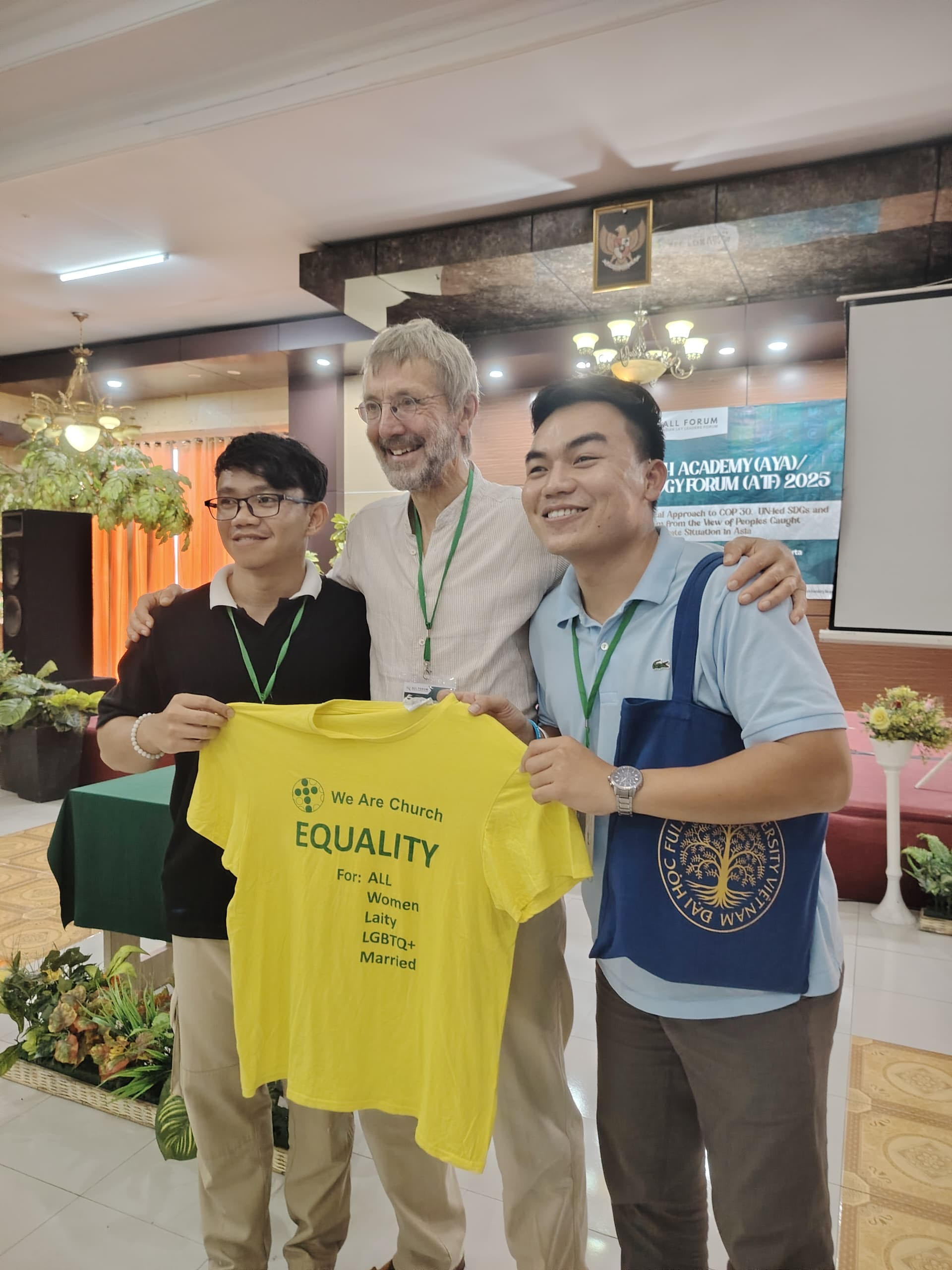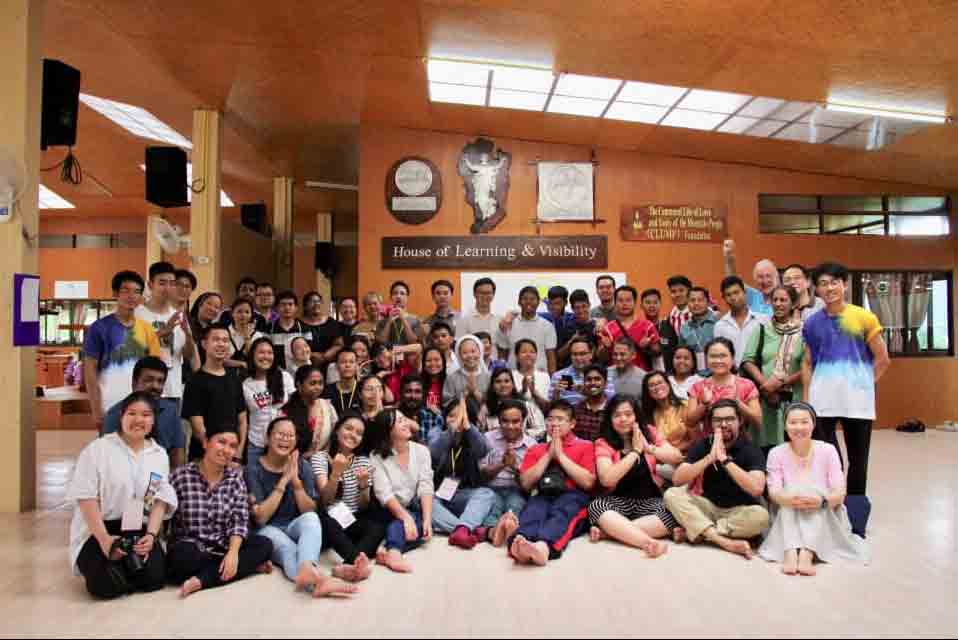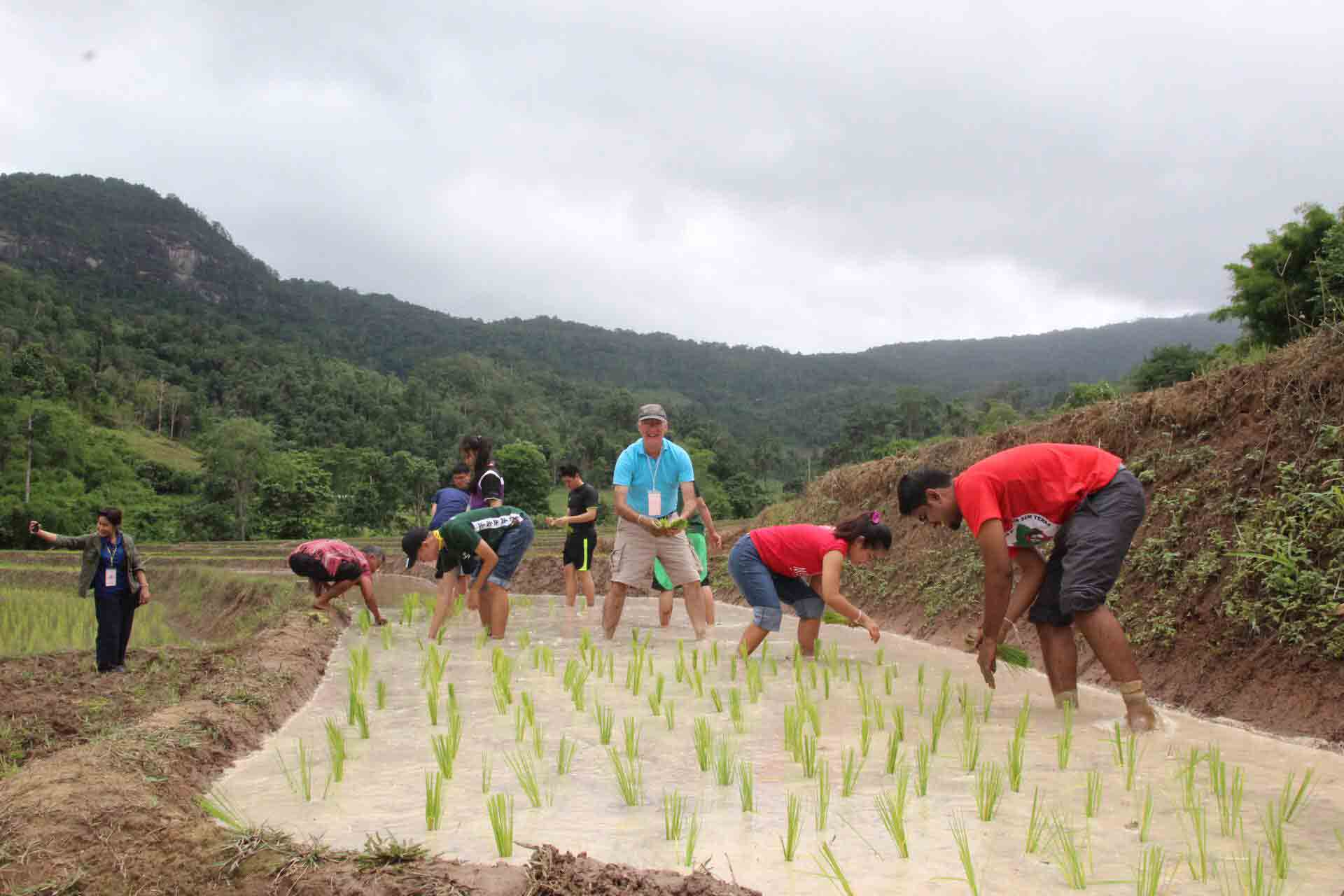Asian Lay Leaders Forum (ALL Forum) 2025
As part of the forum, participants spend three days with local people
17 August 2025
In the morning, eight of us drive to an indigenous village about 64 km outside of Yogyakarta. The last few kilometres are quite a bumpy ride. There are 40 adults and 53 children living here.
We are greeted by two village elders and several men. Many women also come to greet us and shake our hands, but there are only men in the meeting room. The two elders explain the village community in Indonesian; an Indonesian translates into English. Afterwards, there is a communal lunch, which has been cooked by the women. The women do not take part in the communal meal, but they enter the common room afterwards and also take part in the conversation.
There are no tables or chairs. Everything takes place on the floor. Cooking is also done on the floor, over an open fire. We get to pound rice. There is a longer break after the meal. We talk to the women and children.
The children are curious and sociable. Before long, two girls around twelve years old begin to dance, with music playing from a smartphone while the other children chuckle and laugh.
Towards evening there is another round of discussion, followed by a short liturgy and then dinner. After dinner, there is a general round of introductions in which the women also take part.
After the introductions, we head out onto the covered terrace, where a relaxed conversation quickly develops. Someone suggests that the guests should sing. The participants from Laos, Vietnam, Malaysia, the Philippines and Indonesia can really sing. In the case of a few songs that are obviously well-known, everyone sings along. The mood is exuberant. You don’t need language to communicate!
The people here believe in a creator God who created the world and its people. They practice monogamy and divorce is possible. Many of them work on a farm outside the village. They also depend on goats and chickens to help meet their needs.
We spend the night in the village in a separate room that a family has obviously temporarily vacated for us. The sanitary facilities are very basic, and we sleep on mattresses on the floor.
18 August 2025
When I wake up in the morning, the children and the woman of the house are walking through our bedroom as if we aren’t even there. After breakfast, they move at a leisurely pace – why rush? Suddenly, an army officer appears with an escort. He wants to see our passports. We are confused at first, then gradually amused. The army officer seems to have plenty of time. He accepts a cup of tea and has a long chat with one of the elders while smoking. Finally, we also sit down with them and listen to various stories from the officer about the small border traffic between Malaysia and Indonesia on Kalimantan (formerly Borneo), where he was stationed for several years.
Afterwards, the village elder apologises to us repeatedly, saying this has never happened before. He probably assumes that we might have been confused or even intimidated by the unannounced visit. But the answer to our question about the reason for the visit is somewhat vague. Ultimately, it seems that the army is quite interested in who comes to the indigenous village and what ideas they bring with them.
We play the card game Uno or volleyball with the children. In the kitchen, we are allowed to help prepare a typical local grain-based dish.
There are brief rain showers, as it is the rainy season.
I have a long chat with Doo, a participant who comes from Laos and was a Buddhist monk for eight years. He tells me about the ascetic lifestyle of Buddhist monks (waking at 5 a.m. in summer and 2 a.m. in winter). During their training, the monks have to memorize a great deal and even walk 1,000 km barefoot at one point. The day is very structured, similar to in a Cistercian monastery.
In the afternoon people drink tea, smoke and talk. Many of the men smoke, but none of the women do. I don’t see a television screen or antenna in the village, but there is electricity. Running water is only available from a tap in the toilet, which also serves as the bathroom. Water comes from plastic bottles or is collected from the rain; otherwise, no plastic packaging is visible.
All the food is freshly prepared from rice and what is grown in the village. Bananas and peanuts are always included, and sometimes chicken. I haven’t seen a refrigerator
My questions about village organisation, property ownership and children’s school attendance are only partially answered, which may be because I ask my question to an Indonesian participant, who translates it and then translates the answer back for me. In any case, there is private property: the houses belong to individual families, but the families have to contribute to communal tasks.
At mealtimes, the separation is not as strict as it was the previous day. Women and children are present at lunch. During dinner, the women initially stay outside but then come in and mingle with us.
After dinner, our hosts sing religious songs from their songbook (stapled together from photocopies). An Indonesian explains the meaning of the songs to us. A song is usually sung by a lead singer, sometimes alternating with the entire congregation. There are also songs interspersed with short spoken verses. Words of thanks are then exchanged. Our hosts apologise for the modest conditions here, for the embarrassing visit by the military, and thank us for coming. We also express our thanks at length. The exchanges of thanks, answers, and questions take about an hour, but the mood in the room remains relaxed.
19 August 2025
Life in the village moves at a leisurely pace. The women are in the kitchen preparing breakfast. Two or three people could manage it on their own, but efficiency is not a priority here. What else should the other women do during this time? This also has to do with communication. The kitchen is a communal kitchen where food is cooked for the entire village. However, not everyone always eats together. The families usually take the food into their own homes. Our visit is clearly an exception, as many men, women and children eat together with us.
The men sit on the terrace, drinking tea and smoking; some chat, while others remain silent. The Indonesian participants speak with them from time to time.
Then comes the farewell. Our hosts are in tears. Women and men hug us and give us food to last at least two days. Photos are taken in different group combinations. Then it rains again. We get into the car and leave.



 We Are Church has been sending a delegate to the Asian Youth Academy (AYA) and Asian Theology Forum (ATF) since 2013 (Didier van Houtte; Jean Pierre Schmitz; Martha Heizer and myself). It is organised by the Asian Lay Leaders (ALL) Forum which is managed by Paul Hwang. ALL invites young leaders (aged 25 – 35) from 12 – 15 different Asian countries to spend 10 days together learning about each others countries especially regarding Indigenous Peoples (IP), the environment, climate change, community building, cultures and faith development. In 2019 the meeting was in ChiangMai in Thailand, based in the CLUMP Centre in Doi Thong.
We Are Church has been sending a delegate to the Asian Youth Academy (AYA) and Asian Theology Forum (ATF) since 2013 (Didier van Houtte; Jean Pierre Schmitz; Martha Heizer and myself). It is organised by the Asian Lay Leaders (ALL) Forum which is managed by Paul Hwang. ALL invites young leaders (aged 25 – 35) from 12 – 15 different Asian countries to spend 10 days together learning about each others countries especially regarding Indigenous Peoples (IP), the environment, climate change, community building, cultures and faith development. In 2019 the meeting was in ChiangMai in Thailand, based in the CLUMP Centre in Doi Thong. water. We visited the weaving operations and had a long Question & Answer session with the village chief via interpreters and facilitators as the Karen people have their own language, which is very different to the Thai language; we had meals in our host families who looked after their guests first before eating themselves. We helped the village repair their access road with stone chippings, which we helped distribute to fill in holes and repair the road. Our village has now got many links with the outside world; 30 years ago they were totally agriculture based and self sufficient; today many of the young work in the city; and today the village has several pick up trucks, motor bikes, water & electricity supply, Satellite TV and mobile phone network coverage. They are mostly Catholic with a good number of Buddhists who cooperate well together.
water. We visited the weaving operations and had a long Question & Answer session with the village chief via interpreters and facilitators as the Karen people have their own language, which is very different to the Thai language; we had meals in our host families who looked after their guests first before eating themselves. We helped the village repair their access road with stone chippings, which we helped distribute to fill in holes and repair the road. Our village has now got many links with the outside world; 30 years ago they were totally agriculture based and self sufficient; today many of the young work in the city; and today the village has several pick up trucks, motor bikes, water & electricity supply, Satellite TV and mobile phone network coverage. They are mostly Catholic with a good number of Buddhists who cooperate well together.